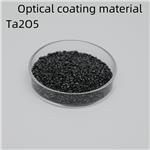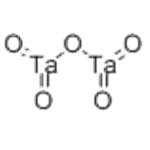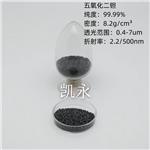white to white-beige powder
Tantalum pentoxide, Ta2O5, is a white powder existing in two thermodynamically stable modifications. The orthorombic b-phase changes at 1,360 °C (2,480 °F) into the tetragonal a-modification. The existence of an e-modification has also been reported. Tantalum pentoxide reacts slowly with hot hydrofluoric acid but is insoluble in water and in most solutions of acids and alkalies. For analytical purposes, it can be dissolved by fusion with alkali hydroxides, alkali carbonates, and potassium pyrosulfate.
White orthorhombic crystal or powder; density 8.20 g/cm3; melts at 1,785°C; insoluble in water, ethanol and practically all acids; soluble in hydrofluoric acid; solubilized by fusion with caustic potash or potassium hydrogen sulfate.
Dielectric used in film
supercapacitors. Tantalum
oxide is a high-refractiveindex, low-absorption material
used in making optical coatings
in the near-UV (350 nm) to
IR (8 μm). Insoluble in
most chemicals except HF,
HF-HNO3 mixtures, oleum, fused alkali hydroxides (e.g.,
NaOH, KOH), and molten
pyrosulfates.
Tantalum pentoxide is used in making high refractive index optical glass; as a dielectric film on tantalum for its use as a capacitor component and rectifier; and for preparing tantalum metal, its carbide, and many other tantalum compounds.
Tantalum pentoxide (Ta2O5) is used to make special optical glass, for lasers, and in electronic
circuits.
Tantalum oxide is used to make optical glass for lenses and in electronic circuits.
Tantalum pentoxide is obtained as an intermediate in extracting tantalum from the columbite-tantalite series of minerals. Also, the oxide can be made by heating Ta metal in oxygen or air at elevated temperatures.
Tantalum pentoxide is dielectric in nature making it useful for making capacitors in the electronics industry.
Flammability and Explosibility
Non flammable
reagent type: catalyst
core: tantalum
Mildly toxic by ingestion. Incompatible with ClF3, BrF3, Li. See also TANTALUM.



